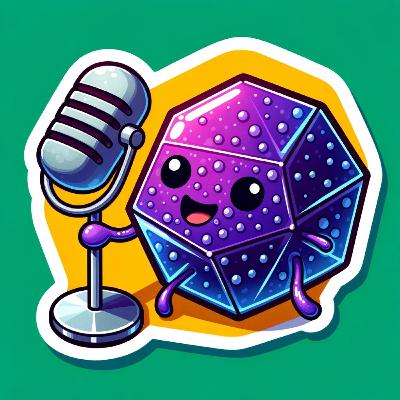Does every scientist need an AI co-scientist? How two professors solved a years-long viral mystery
Description
"I was so biased. I knew too much and that's why we couldn't see the obvious answer that was right in front of us for years."
In this episode of the Podovirus Podcast, we explore the intersection of AI and phage biology with Professors José Penadés and Tiago Costa from Imperial College London. They share their recent discovery about phage-inducible chromosomal islands (PICIs) and how Google's new (not-yet-released) AI co-scientist tool independently reached the same conclusions they had spent years working toward—revealing how tailless phage capsids can bind with different phage tails to expand their host range.
Here's a taste of what we discussed:
1. 🧬 First, the biology: José and Tiago discovered that sometimes the end product of a viral lifecycle isn't infectious (yet). It might instead float around as a half-virus (a 'tail-less capsid'), and even mix and match with halves (tails) of other viruses floating around, enabling it to get into a vast array of totally different cells with one simple genetic code. This is the story of PICIs (phage-inducible chromosomal islands).
2. 🤖 How Google's AI co-scientist tool—without access to their unpublished data on this project—accurately proposed the hypotheses and experiments it took them years to come up with (because they seemed to go against dogma in the field)
3. 🔬 Why 'knowing too much' can be an obstacle to discovery in science, the beauty of an unbiased companion, piecing apart what they would have done differently if they'd had AI all along, and how José and Tiago will be using AI tools going forward
Chapters
00:00 Introduction: AI + phage research, and why we wanted to talk to José and Tiago!
02:10 First, the biology background: exploring PICIs (phage-inducible chromosomal islands) and their significance
10:13 The role of AI in hypothesis generation
19:08 Interpreting data and overcoming bias
28:40 Future implications of AI in phage therapy
37:25 Experimental evidence and hypotheses validation
40:46 AI tools and their effectiveness
44:38 Interpreting AI outputs and experimental design
51:30 The role of AI in scientific discovery
57:30 Future of AI in research and collaboration
Papers discussed:
1. José and Tiago's new preprint on the science of PICIs: https://www.biorxiv.org/content/10.1101/2025.02.11.637232v1.full
2. Their companion preprint on exactly how they worked with the AI co-scientist (+ benchmarking against other AI tools!): https://www.biorxiv.org/content/10.1101/2025.02.19.639094v1
More info about Google's AI co-scientist: https://research.google/blog/accelerating-scientific-breakthroughs-with-an-ai-co-scientist/
More info about their research:
José's lab: https://profiles.imperial.ac.uk/j.penades/about
Tiago's lab: https://profiles.imperial.ac.uk/t.costa
Want to learn more about phage satellites? Check out this new Nature Reviews Microbiology by José's team: https://www.nature.com/articles/s41579-025-01156-z





